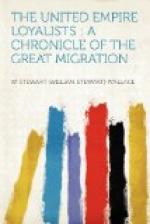Much labour has been spent on the problem of the numbers of the Loyalists. No means of numbering political opinions was resorted to at the time of the Revolution, so that satisfactory statistics are not available. There was, moreover, throughout the contest a good deal of going and coming between the Whig and Tory camps, which makes an estimate still more difficult. ‘I have been struck,’ wrote Lorenzo Sabine, ’in the course of my investigations, with the absence of fixed principles, not only among people in the common walks of life, but in many of the prominent personages of the day.’ Alexander Hamilton, for instance, deserted from the Tories to the Whigs; Benedict Arnold deserted from the Whigs to the Tories.
The Loyalists themselves always maintained that they constituted an actual majority in the Thirteen Colonies. In 1779 they professed to have more troops in the field than the Continental Congress. These statements were no doubt exaggerations. The fact is that the strength of the Loyalists was very unevenly distributed. In the colony of New York they may well have been in the majority. They were strong also in Pennsylvania, so strong that an officer of the revolutionary army described that colony as ‘the enemies’ country.’ ‘New York and Pennsylvania,’ wrote John Adams years afterwards, ’were so nearly divided—if their propensity was not against us—that if New England on one side and Virginia on the other had not kept them in awe, they would have joined the British.’ In Georgia the Loyalists were in so large a majority that in 1781 that colony would probably have detached itself from the revolutionary movement had it not been for the surrender of Cornwallis at Yorktown. On the other hand, in the New England colonies the Loyalists were a small minority, strongest perhaps in Connecticut, and yet even there predominant only in one or two towns.
There were in the Thirteen Colonies at the time of the Revolution in the neighbourhood of three million people. Of these it is probable that at least one million were Loyalists. This estimate is supported by the opinion of John Adams, who was well qualified to form a judgment, and whose Whig sympathies were not likely to incline him to exaggerate. He gave it as his opinion more than once that about one-third of the people of the Thirteen Colonies had been opposed to the measures of the Revolution in all its stages. This estimate he once mentioned in a letter to Thomas McKean, chief justice of Pennsylvania, who had signed the Declaration of Independence, and had been a member of every Continental Congress from that of 1765 to the close of the Revolution; and McKean replied, ’You say that ... about a third of the people of the colonies were against the Revolution. It required much reflection before I could fix my opinion on this subject; but on mature deliberation I conclude you are right, and that more than a third of influential characters were against it.’




